Nomenklatura
Society

Despite Communist ideology’s goal of an egalitarian society, a ruling class endowed with both political power and economic privileges established itself within the USSR and the democratic republics: it was known as the nomenklatura. It originated with the lists (from the Latin nomenclaturae) of possible candidates for key positions within the party and state administrations. These lists were officially established by the Communist Party of the Soviet Union. By extension, the word nomenklatura came to designate all party officials designated in this manner in the USSR and the satellite states. Thanks to their salary and other benefits, members of the nomenklatura had much greater access to consumer goods than the rest of the population. While the use of so-called luxury products, like private cars, was officially discouraged – and despite shortages of many products and services (housing, food, common consumer goods), this small minority could access reserved distribution systems and enjoy the best services at low prices. These differentiations within Communist society were accompanied by the creation of a semi-legal or illegal parallel economy that was based on corruption and the embezzlement of state property. Through its very existence, the nomenklatura revealed the material and symbolic failure of an entire system.
Archive
Special elite restaurants
In the USSR, people occupying high-ranking offices in the administration, the economy or the Party have access to special restaurants.
country: Soviet Union / year:
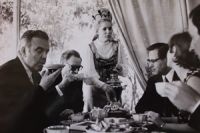
In the USSR, people occupying high-ranking offices in the administration, the economy or the Party have access to special restaurants. This is both a material and a symbolical advantage: it creates a lifestyle and an image. As a visible sign of the membership in the elite, it comes with a number of gratifications that make all the difference.
The Golden Youth
The rise of the nomenklatura benefitted many of their children as well.
country: Soviet Union / year:
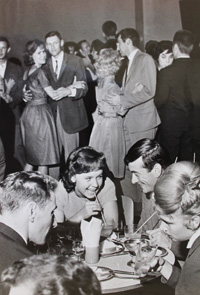
The rise of the nomenklatura benefitted many of their children as well. With Brezhnev’s accession to power, the nomenklatura finally reached the stability to which it had aspired since the Stalinist period. The 1970’s signaled the golden age of “soviet feudalism,” one that first Stalin, then Khrushchev had fought relentlessly.
The ZIL car
The Soviet firm Z.I.S., re-christened Z.I.L. in 1956, produced prestige automobiles.
country: Soviet Union / year:
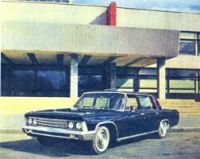
The Soviet firm Z.I.S., re-christened Z.I.L. in 1956, produced prestige automobiles – actually poor copies of heavy, pre-war American cars – for the nomenklatura. Cars remained a rare possession in the USSR. Owning a luxurious one was an ostentatious sign of belonging to the ruling elite.
The Yalta Hotel in Crimea
Soviet officials preserved and developed the beach resorts that had sprung up on the shores of the Black Sea in the late 19th century.
country: Soviet Union / year:
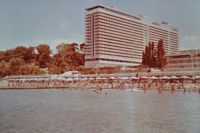
Soviet officials preserved and developed the beach resorts that had sprung up on the shores of the Black Sea in the late 19th century. Even Stalin himself liked to unwind at one of them: Sochi, at the foot of the Caucasus Mountains, where he would spend his summers with his entourage. Built in 1977, and extensively equipped (bars, restaurants, a solarium, concert hall and cinema, park with beach access), the monumental Hotel Yalta, in Crimea, is an example of those luxurious modern
Inside the house of the Nomenklatura
The nomenklatura, those “worthy of the Party’s trust,” lived in housing the rest of the population could only dream of.
country: Soviet Union / year:
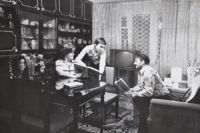
The nomenklatura, those “worthy of the Party’s trust,” lived in housing the rest of the population could only dream of. There were such unattainable goods as telephones, household appliances (Czech or Hungarian for the very well furnished, Soviet for lower-level cadres) sometimes even a car. Parquet floors, furniture in dark lacquered wood, quality tableware, books in collector’s editions and even crystal lamps/chandeliers for the highest-ranking members. A nice 3-to-4 room apartment seemed like the height of comfort to anyone living in a run-down communal apartment who had to share their kitchen, bathroom and privacy with other families. All that luxury (though limited in comparison to the West) fed the jealousy and sentiment of exclusion between “us” and “them”.
Polish ad for PEWEX stores
In both the USSR and its satellite states, you could buy imported items at “dollar stores,” where only Western currencies were accepted
country: People's Republic of Poland / year:
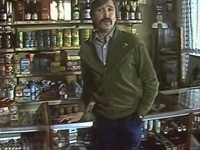
In both the USSR and its satellite states, you could buy imported items at “dollar stores,” where only Western currencies were accepted, the local currencies not being exchangeable. PEWEX, a chain of stores that opened in Poland in 1974, was aimed essentially at natives, rather than foreign tourists. While liquor represented at least 30% of their sales figures, as national-production supply fell behind demand PEWEX also began to sell more and more consumer goods. This led to a noticeable distinction between those who did have access to foreign currencies and those who didn’t. At the Solidarnosc union’s insistence, the Gdansk accord of August, 1980, included a provision banning the sale of consumer goods and locally produced products at those stores.
Press conference about corruption within the Polish public administration
By posing questions about the personal wealth of members of the administration that is clearly above and beyond their salaries
country: People's Republic of Poland / year:
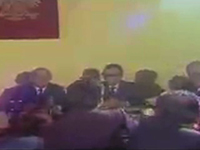
By posing questions about the personal wealth of members of the administration that is clearly above and beyond their salaries, this press conference raises – albeit in veiled terms – the question of corruption amongst civil servants, to which the Minister gives a conventional answer, speaking simply of “regulation.” The other questions concern the administration’s hiring and promotion processes: “Should there be tests? Is it appropriate to introduce some competition?” The questions actually target the entire nomenklatura system.
Western fashion in Budapest
Fashion shows and the opening of western couture boutiques
country: People's Republic of Hungary / year:
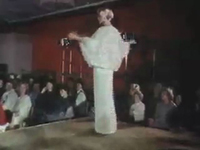
Fashion shows and the opening of western couture boutiques (e.g. Pierre Cardin) bear witness to Communist Hungary’s opening to western fashion. At the same time, they were stark symbols of the gap between the privileged classes, who had access to these foreign goods, and the rest of the population, who, like these “men in the street,” could only stare at the shop windows...